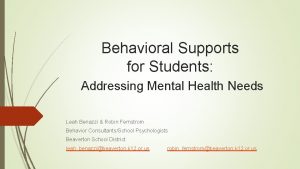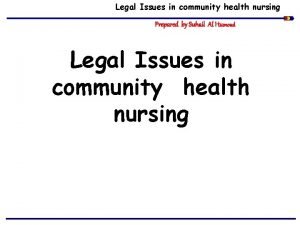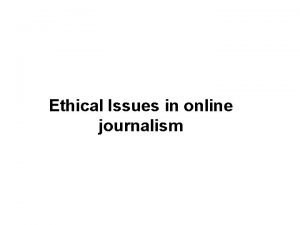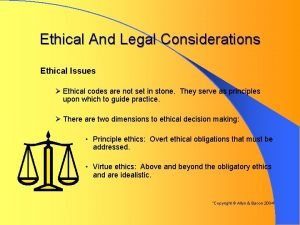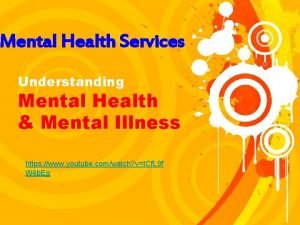ETHICAL ISSUES IN ONLINE MENTAL HEALTH INTERVENTIONS Presenter








- Slides: 8

ETHICAL ISSUES IN ONLINE MENTAL HEALTH INTERVENTIONS Presenter: Professor Reeva Lederman Co-authors: Simon D’Alfonso Simon Coghlan Greg Wadley John Gleeson Simon Rice Mario Alvarez-Jimenez

Advantages of Online Therapies • Increasing worldwide problem of mental illness not well catered for • 24/7 • Support for Rural communities • Scalable • Inexpensive for user- accessible • AI provides new opportunities

MOST, Moderated Online Social Therapy Psychotherapy, Online Chat, Moderation See References in Paper

ETHICAL ISSUES?

Ethical issues arising from online mental health applications • Internet addiction (Carillo et al, 2014, King et al, 2015) • Protecting Personal • Miscommunication (Childress 2000) • Diversion from face-to Information (Batoroev et al. , face therapy (Teuta and 2015, Childress, 2000, Teuta and Hackbarth, 2014) • Knowing the Legitimacy of Providers (Barak, 1999, Bailey et al. , 2018) • Asynchronicity (Gleeson et al. , 2017) • Efficacy ( does it maintain TA) (Buchi et al, 2016) • Technologies may exacerbate vulnerabilities

Four Principles Framework “Principlism” (Beuchamp and Childress, 2001) Provides a coherent way of identifying, organising, and explaining ethical concerns 4 Components: • Nonmaleficence • Beneficence • Respect for Autonomy • Justice

Ethical problems concerns Privacy Ethical principles MOST response and Nonmaleficence Autonomy Therapy groups restricted to registered users “Hide/unhide” functions Anonymous publication of attempted therapy modules Pseudonymous usernames accommodated Confidentiality Nonmaleficence Autonomy Qualified therapists used as moderators Beneficence Moderator training Informed consent Autonomy Nonmaleficence Full Induction into systems by trained RAs

Conclusion • We have validated the ethical foundations of our example system by showing how four principle framework can be applied to it. • Can inform the design and use of online mental health treatments in future.
 Example of emotional health
Example of emotional health Ethical and legal issues in community health nursing
Ethical and legal issues in community health nursing Ethical issues in health promotion
Ethical issues in health promotion Mental health and mental illness chapter 20
Mental health and mental illness chapter 20 Mental health jeopardy
Mental health jeopardy Perbedaan ethical dilemma dan ethical lapse
Perbedaan ethical dilemma dan ethical lapse Ethical lenses army
Ethical lenses army Perbedaan ethical dilemma dan ethical lapse
Perbedaan ethical dilemma dan ethical lapse The perceived relevance or importance of an ethical issue
The perceived relevance or importance of an ethical issue
